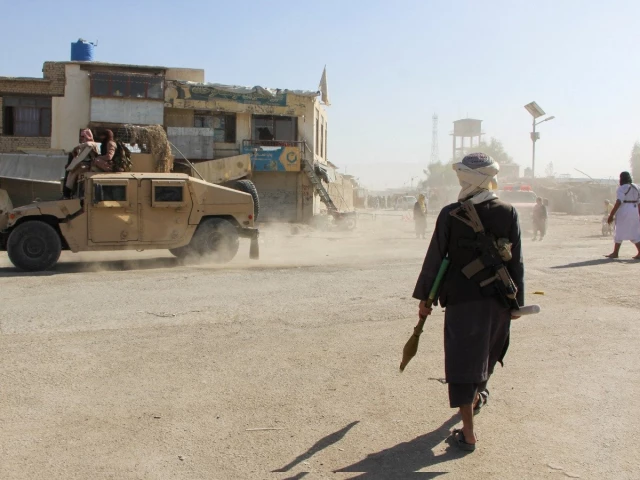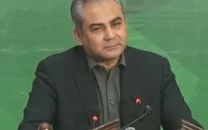Pakistan stands firm on Taliban terror clampdown
Islamabad questions Kabul's sincerity over cross-border attacks

Pakistan has conveyed a firm message to the Afghan Taliban during recent talks in Istanbul, declaring that the continued patronage of terrorist groups by Kabul's rulers is unacceptable, security sources said on Sunday.
Pakistan laid out its final position in the talks, telling the Taliban leadership to take concrete and verifiable measures against militant elements operating from Afghan soil, the sources added.
According to officials familiar with the development, Islamabad made it clear to the Taliban regime that all cooperation with Kabul would hinge on concrete action against the banned Tehreek-e-Taliban Pakistan (TTP), the Balochistan Liberation Army (BLA), and other terrorist outfits based in Afghanistan.
Negotiators from both sides began discussions on Saturday aimed at hammering out a lasting ceasefire. Islamabad reportedly warned that failure of the Istanbul talks could lead to "open war".
Sources said the Pakistani side emphasised that without decisive action, no meaningful progress could be achieved in improving bilateral relations.
"Concrete and definite steps will have to be taken to eliminate this menace," one security official quoted the delegation as saying. "This is a near one-point agenda. We will not budge on this,' another official privy to the talks told The Express Tribune.
Security officials described the Taliban's response as 'illogical and detached from ground realities', suggesting that Kabul's representatives appeared unwilling to acknowledge the problem.
"It seems that the Taliban are following another agenda," one source said, adding that this approach "is not in the interest of the stability of Afghanistan, Pakistan and the region".
The dialogue reportedly faced difficulties, with insiders saying the talks "encountered problems" despite efforts to keep the process on track. The first round is said to have lasted almost nine hours, during which Pakistan presented a detailed set of proposals to address its security concerns.
The officials said that Islamabad had begun to question the sincerity of the Afghan Taliban in tackling terrorism emanating from their soil — a scepticism reinforced by recent cross-border incidents.
Earlier on Sunday, the Inter-Services Public Relations (ISPR) said Pakistan had foiled two infiltration attempts from across the Afghan border, carried out by terrorists belonging to the banned TTP.
'It is significant to point out that these infiltration attempts by Fitna al Khwarij [TTP] are being carried out at a time when delegations of Pakistan and Afghanistan are engaged in talks in Turkiye, casting doubts on the intentions of the Interim Afghan Government regarding terrorism originating from its soil,' the military's media wing said.
'Pakistan has laid out sufficient proof of the presence of Fitna al Khwarij and Fitna Hindustan on Afghan soil, including the presence of their leadership being sheltered by the Afghan Taliban,' a well-placed source added.
"The Afghan Taliban, being non-state actors themselves, seem to be struggling to understand the consequences of such an unreasonable attitude, wherein they appear willing to stand by a non-state actor against inter-state relations with Pakistan — a country that has been the largest benefactor of the Afghan people for decades."
The ISPR statement urged the Afghan authorities to ensure effective border management and to fulfil their obligations under the Doha Agreement, which binds Kabul to prevent its territory from being used by militants against other countries.
The Istanbul talks, facilitated by Turkey, form part of renewed efforts to ease friction between Islamabad and Kabul amid a surge in terror attacks in Pakistan from across the border.
According to sources, Pakistan entered the talks with clarity, presenting evidence to support its stance, and maintained that it would not engage with Fitna al Khwarij and the Afghan Taliban rescinded their support for proxy leaders.
While both sides are said to be committed to continuing dialogue, officials warned that progress would remain elusive unless Kabul took visible action against anti-Pakistan groups.
Since the Taliban's return to power in August 2021, Pakistan has witnessed an unprecedented surge in terrorist attacks. More than 3,800 Pakistanis — including soldiers, police personnel and civilians — have lost their lives in such incidents.
Pakistan has repeatedly pursued diplomatic efforts to resolve the issue, but the number of attacks has continued to rise in recent weeks, eventually prompting Islamabad to carry out air strikes inside Afghanistan. The escalation led to deadly border clashes, leaving dozens dead on both sides.
The two countries finally agreed to a ceasefire in their first round of talks in Doha on October 19. Both sides decided to establish a mechanism to prevent future escalations and address the root causes of tension.
According to the sources, the Afghan Taliban's refusal to move forward on Pakistan's just demand — which has been endorsed by Turkiye, Qatar, Saudi Arabia and the UAE — indicates that their agenda may be influenced by India, which is seeking to re-establish its foothold in Afghanistan.
A deadlock in the deliberations, the sources warned, would force Pakistan to take a difficult path to resolve the TTP issue — one that will carry a cost. "Nonetheless, Afghanistan will also have to pay a higher price, for which the Afghan Taliban will be responsible," a senior official concluded.
(WITH INPUT FROM NEWS DESK)






















COMMENTS (2)
Comments are moderated and generally will be posted if they are on-topic and not abusive.
For more information, please see our Comments FAQ